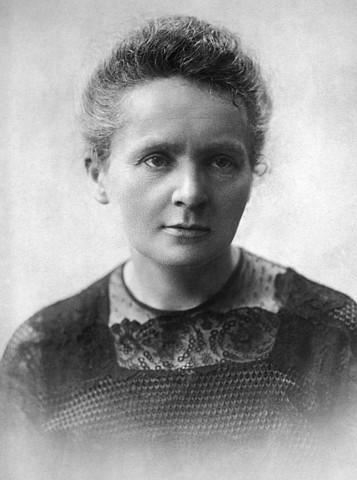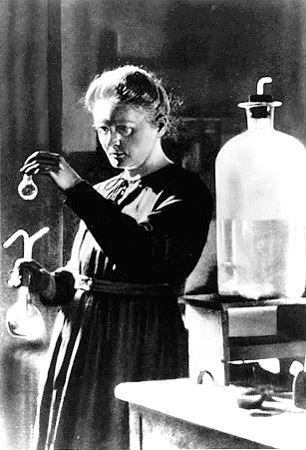 |
A hero is a fictional person that often has great strength or ability. It can also be can be a man or women admired for his or her achievements and noble qualities. One that shows great courage or an idol is also a hero. Marie Curie is one of many heroes. Marie is a hero because she was the first person to discover radioactivity, an atomic property, opening the door to 20th century science. She is my hero because she helped save a lot of people even though she didn't know it. She and her husband didn't work and study science for money of for being famous but for the satisfaction of helping others.
Marie Sklodowski Curie was born on November 7, 1867 to her mother, Bronsita Boguska, and father, Wladyslaw Sklodwski. There were also four brothers and sisters in her family. Marie received a general education in local schools and some scientific training from her father. In 1891, she went to Paris to continue her studies at the Sorbonne where she obtained Licentiates in Physics and the Mathematical Sciences. She met a man, Pierre Curie and later married on July 26, 1895. Marie gave birth to her first child, Irene, in 1897.
 |
For the rest of Marie's life she studied science. Marie changed the world by discovering radium which is now used for the treatment of cancer and other diseases. Marie also discovered polonium "which is used to eliminate static electricity in machinery that is caused by processes such as the rolling of paper, wire or sheet metal." Marie's motivation for becoming such a great scientist was that although she was convinced of the practical use for radium she wanted to find new and more useful ways for it. Tragically, Marie died on July 4, 1934 at the age of 67.
Some interesting facts about Marie are that she was the first woman to teach at the Sorbonne in Paris, and the first woman to receive a Nobel Prize. Also, the notebooks she used are still radioactive. The element curium, discovered in 1944, was named in honor of Marie and her husband, Pierre. Together with her husband, she was awarded half of the Nobel Prize for Physics in 1903, for their study into the spontaneous radiation discovered by Becquerel, who was awarded the other half of the Prize. In 1911, she received a second Nobel Prize, this time in Chemistry, in recognition of her work in radioactivity.
In conclusion, Marie was a great women and scientist. She devoted her whole life to science. He received many awards including four Nobel Prizes. Marie shows the pillar of caring, respect, and responsibility. As Marie said, "Be less curious about life and more curious about ideas."
Page created on 11/17/2008 12:00:00 AM
Last edited 11/17/2008 12:00:00 AM
The Nobel Foundation. "NobelPrize.org." [Online] Available http://nobelprize.org/nobel_prizes/physics/laureates/1903/marie-curie-bio.html.
University of Cal.. "Radium." [Online] Available http://periodic.lanl.gov/elements/88.html.
Gagnon, Steve. "It's Elemental- Polonium." [Online] Available http://education.jlab.org/itselemental/ele084.html.
Lewis, Jone Johnson. "Marie Curie." [Online] Available http://womenshistory.about.com/od/mariecurie/p/marie_curie.htm.
Nilsson, Katrin. "Marie Curie- Childhood." [Online] Available http://web.telia.com/~u54808711/inenglish/katrin/MarieCurie/childhood.html.
